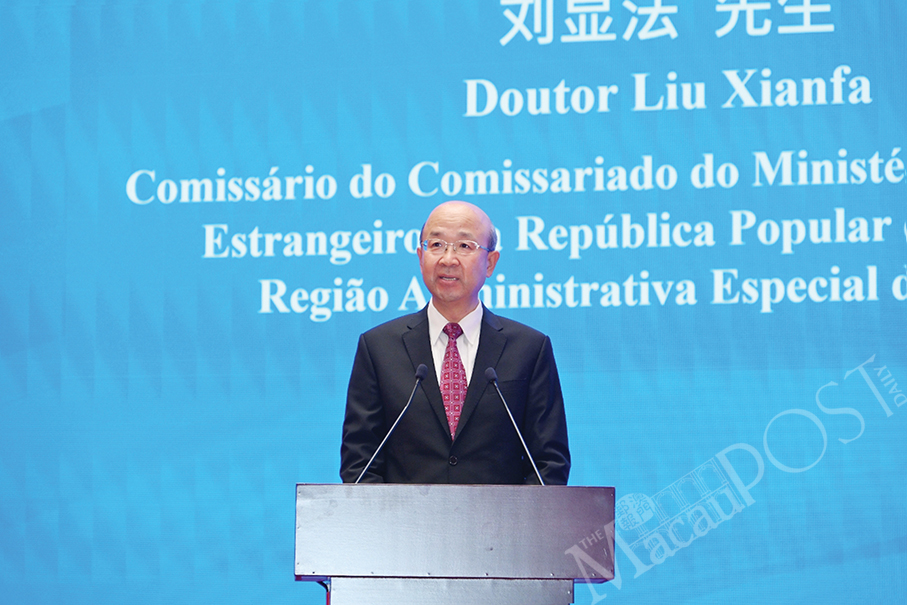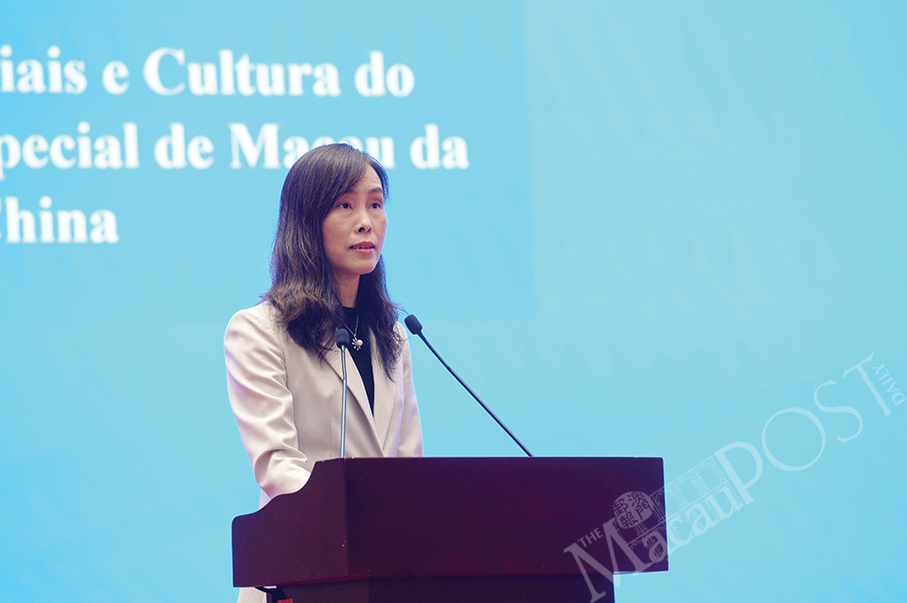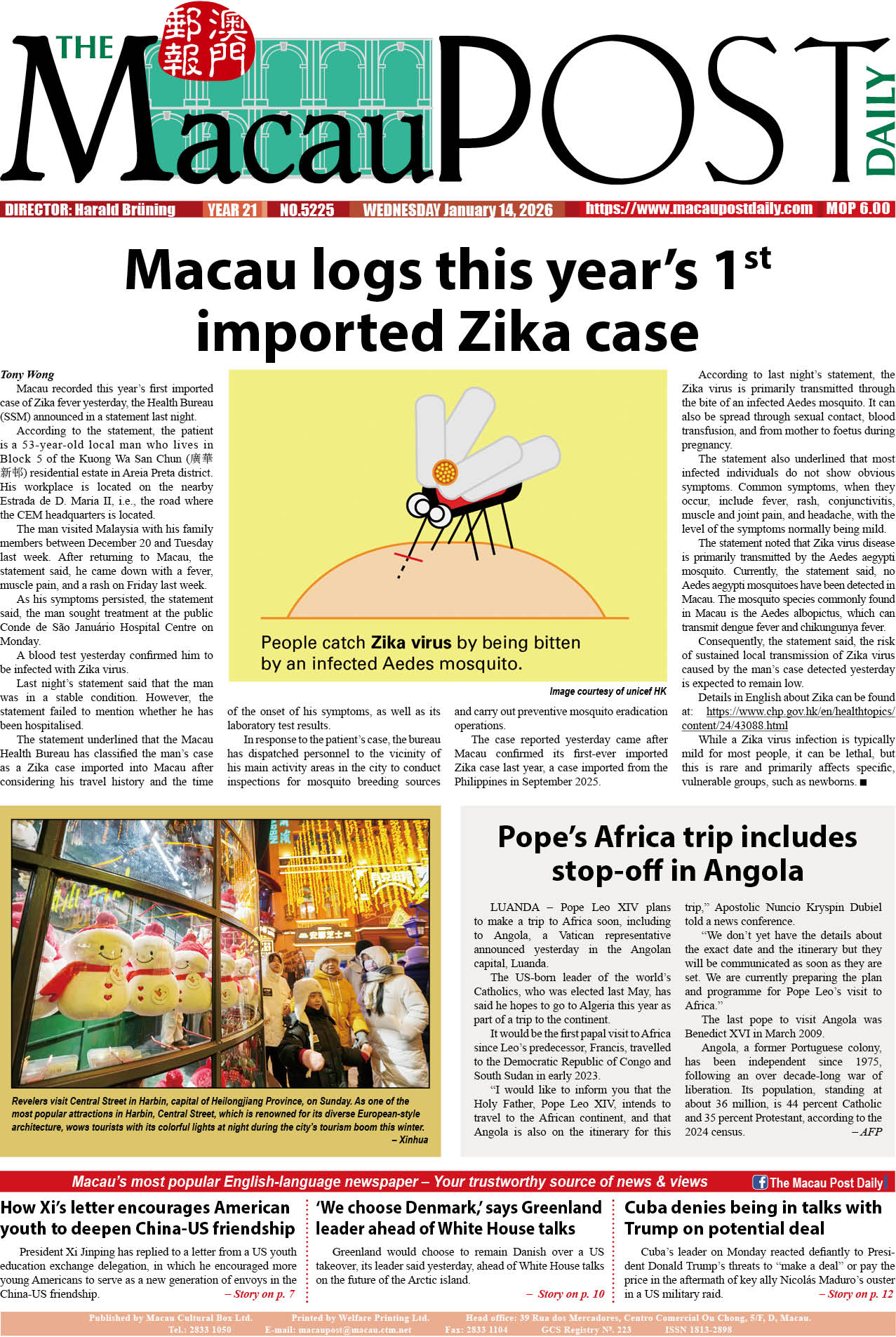A forum of think tanks from China – including Macau – and Portuguese-speaking countries was held yesterday afternoon at the China-Portuguese-speaking Countries Commercial and Trade Service Platform Complex in Nam Van with the aim of further promoting closer Sino-Lusophone collaboration.
About 150 people attended the event, and 19 experts from think tanks and universities as well as academics addressed the about three-hour long forum. The event was co-hosted by the Office of the Commissioner of the Ministry of Foreign Affairs of the People's Republic of China (PRC) in the Macau Special Administrative Region (MSAR) and the Government of the MSAR in conjunction with the Macao Polytechnic University (MPU).
Macau-based Foreign Ministry Commissioner Liu Xianfa said in his speech that thanks to China’s Global Development Initiative (GDI) and Global Security Initiative (GSI) there will be more opportunities for Sino-Lusophone cooperation in the post-pandemic period.
The term “Lusophone” refers to the world’s Portuguese-speaking countries and communities. Portugal was known as Lusitania when it was a province of the Roman Empire. The Portuguese-speaking countries comprise Brazil, Mozambique, Angola, Portugal, Guinea-Bissau, Equatorial-Guinea, Timor-Leste (East Timor), Cabo Verde (Cape Verde), and Sao Tome and Principe. The nine countries have a total population of 290 million, about 73 percent of them in Brazil.
Liu pointed out that it is important to continue to deepen cooperation between China and Portuguese-speaking countries in the economic area and trade, infrastructure and cultural exchanges, and to actively expand collaboration in emerging areas such as governance experiences and new technologies.
Liu also said that Macau has been a bridge between China and Portuguese-speaking countries, since the city’s return to the motherland. He also said that Macau has been actively promoting the development of the Macau Special Administrative Region (MSAR) as “One Centre, One Platform and One Base”, adding that Sino-Lusophone economic and trade cooperation has continued to deepen and has achieved fruitful results.
Macau has been a formal platform for cooperation between China and Portuguese-speaking countries since the Forum for Economic and Trade Cooperation between China and Portuguese-speaking Countries was set up in 2003.
Macau reverted from Portuguese to Chinese administration on December 20, 1999 when China again exercised its sovereignty over the city that had been administered by Portuguese for some four centuries. Portugal unilaterally relinquished its claim of sovereignty over Macau shortly after its anti-colonial Carnation Revolution in April 25, 1974.
Liu said he believed that as the construction of the “Belt and Road” continues to advance, and the construction of the Guangdong-Hong Kong-Macau Greater Bay Area (GBA) and the Guangdong-Macau In-depth Cooperation Zone continues to accelerate, Macau will play an even greater role cooperation between China and the Portuguese-speaking world.
Secretary for Social Affairs and Culture Elsie Ao Ieong U said in her speech the local government hoped to further boost cooperation between academic institutions and think tanks in China and Portuguese speaking countries, so that Macau can fully play its role as a link between think tanks in China – including Macau – and Portuguese-speaking countries, and to promote closer communication and collaboration between China and Portuguese-speaking countries.
Ao Ieong also noted that Macau has a long history of exchanges with Portuguese-speaking countries. She also underlined that Macau has become a service platform for economic and trade cooperation between China and Portuguese-speaking countries, thereby promoting fruitful cooperation in various fields such as education, culture, tourism, the economy, and trade.

Commissioner of the Ministry of Foreign Affairs of the People’s Republic of China (PRC) in the Macau Special Administrative Region (MSAR) Liu Xianfa speaks during yesterday afternoon’s forum of think tanks from China – including Macau – and Lusophone countries at the China-Portuguese-speaking Countries Commercial and Trade Service Platform Complex in Nam Van.

Secretary for Social Affairs and Culture Elsie Ao Ieong U addresses yesterday’s forum. – Photos: GCS







